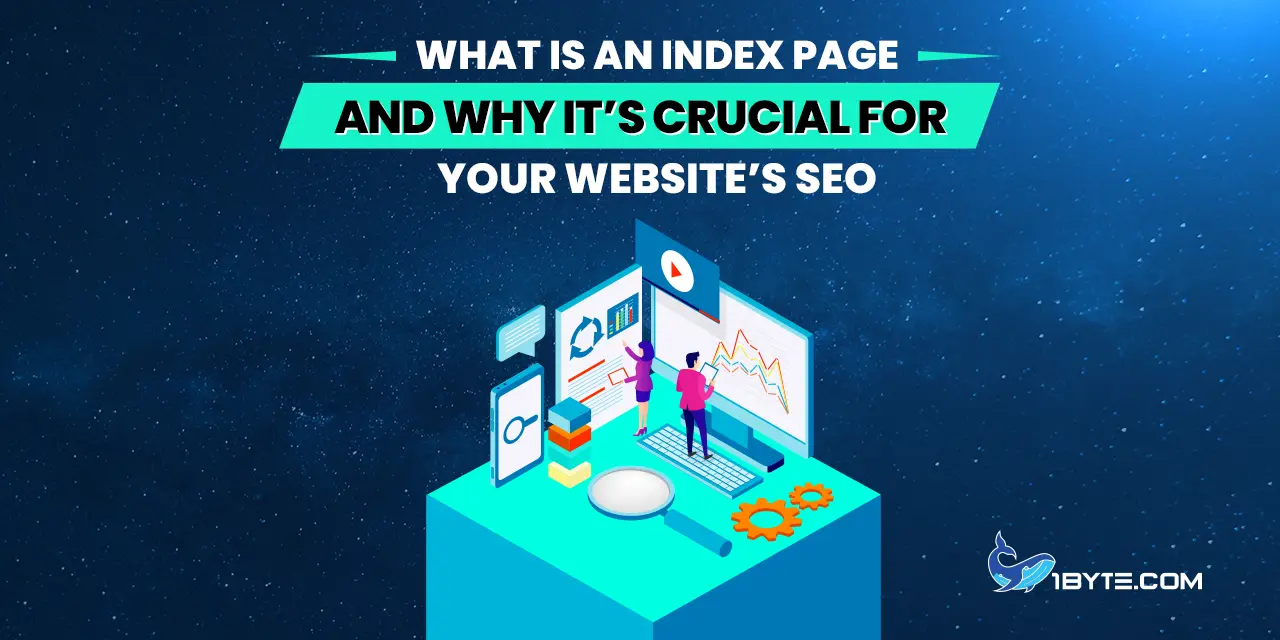For many website owners, “what is an index page” refers to the default homepage that loads when someone visits your domain. In web hosting, the index page is the file the server serves at the root directory (often named index.html or index.php). Namecheap explains it as “the URL or local file that automatically loads,” essentially the main front page of a site. Ensuring this index page exists is essential – hosting guides warn that without it, “your site will not be shown in the browser correctly”. In practical terms, the index page is the first page visitors and search engine bots see. A properly named index file (or a correctly configured DirectoryIndex in .htaccess) ensures the browser and crawlers can access your site.
Definition: Simply put, the index page is the homepage of your website – the default page that loads at your domain’s root. It may also be called the main page or directory index. If you visit example.com/ with no other path, the server looks for an index page to serve. For example, Namecheap lists common default filenames (like index.html or index.php) to use as the homepage. In short, the index page is the gateway to your site’s content. Read this article from 1Byte to find out more.
The Index Page in Your Site’s Structure
The index page sits at the very top of a website’s hierarchy. It links down to major sections, which in turn link to subpages. Think of it as the root of a tree: branches (sections) and leaves (pages) grow from the homepage. This structure matters for SEO. Crawlers (like Googlebot) start at the homepage and follow links to find all pages. A shallow site (where most pages are 1–2 clicks from the index) helps crawlers reach content quickly. For example, SEO experts recommend keeping important pages no more than two clicks from the index page. In practice, pages closer to the homepage often inherit more authority. Backlinko notes that “a page closer to the homepage may get a slight authority boost” compared to pages buried deep in the site. In short, the index page is the hub of your site structure, and how you link from it affects SEO performance.
FURTHER READING: |
| 1. Top 5 Best SEO Plugins for WordPress in 2025 |
| 2. Top 5 Best WordPress Redirect Plugins in 2025 |
| 3. 5 Top WordPress Subscription Plugins of 2025 |
Why the Index Page Matters for SEO

SEO depends heavily on the index page. Here are the key reasons:
- Search Visibility: Search engines must index the index page first. If this page isn’t indexable, your site can’t rank. As one SEO guide explains, “Your page cannot appear in search results without indexing”. In other words, the very first SEO step is to ensure the homepage is crawlable and added to Google’s index. Using an XML sitemap that includes your homepage can speed this up. Since the index page is linked from every page (header, footer, etc.), Google crawls it frequently. One webmaster notes that Google “crawls your homepage often, because [it’s] linked to it from many places like header, navigation or bottom”. This frequent crawl helps new content (linked from the homepage) get found quickly.
- Link Authority: The homepage often holds the majority of a site’s backlinks and authority. A marketing report points out that homepages “often have the strongest link profile” and attract most external links. High-quality backlinks to the index page boost your site’s domain authority, which helps all pages rank higher. For example, Agility PR explains that linking efforts focused on the homepage can “enhance your site’s domain authority”. In practice, links to the index page act like a wellspring of trust: that authority then flows internally to deeper pages.
- Site Structure & Internal Linking: The index page is your site’s internal linking hub. It should link to major sections and content. Good internal linking helps search engines “better understand your website” and “index your pages better”. By placing key links on the homepage, you signal their importance. Remember the SEO rule: important content should be within a couple clicks of the root. A robust internal structure (with the index page at the center) distributes link equity throughout the site. In effect, a well-linked homepage raises the page rank of all linked pages.
- Keywords & Relevance: The index page often targets broad or branded keywords. By optimizing the homepage with your primary terms, you help search engines understand your site’s topic. Ahrefs found that homepages “can rank for relevant non-branded keywords and help other pages on your site to rank too”. That means a clear, keyword-rich homepage can capture general search traffic (like searches for your product or service) and boost site relevance. Use your focus keyword (e.g. main service or brand) in the homepage title, headers, and content. This signals to Google what your site is about and can improve your overall rankings.
- User Experience & Trust: Although not a direct ranking factor, user signals on the index page matter. First impressions count: a well-designed homepage can reduce bounce rate and lead visitors into the site. Users often decide to trust or stay on a site based on the homepage. SEO guides note that a “visually appealing website” increases user trust. In practice, an informative and fast-loading index page encourages visitors to click deeper, improving engagement metrics that Google considers.
Common Pitfalls Without a Good Index Page
Neglecting the index page can severely harm SEO:
- Missing Homepage: If there is no index page, the server may show a directory listing or a 404/403 error. Search engines cannot index such pages. In fact, a 404 or blocked homepage means “search engines can’t crawl your content”. As an SEO expert explains, Google “will definitely not direct people to pages with blocked content (403) or items it thinks don’t exist (404)”. In simpler terms, your site becomes invisible. Another webmaster explicitly warns: without an index file, “Google Bots can’t find your website”. Always have a properly named index file; otherwise the whole site may be deindexed by Google.
- Poor Linking: Sometimes sites bury important pages deep in the structure or fail to link them from the homepage. If key pages are several clicks away or orphaned, they get less link equity and are crawled less often. This runs counter to best practices. Remember, pages deeply hidden in your site tend to rank lower. Ensuring a clear path from the index page to your content is essential; otherwise internal authority is diluted.
- Weak Homepage Content: Some sites make the index page too sparse or generic. A homepage with no clear keywords, title, or content misses an SEO opportunity. If the index page has no relevant text or headings, search engines have little to base their ranking on. In extreme cases, owners accidentally add a “noindex” tag to the homepage. This would instruct Google to ignore the page entirely, killing SEO. (Check your source code to ensure the index page is not set to noindex.) A thin or blank homepage will confuse bots and users alike.
Best Practices for Your Index Page

Follow these guidelines to make your index page SEO-friendly:
- Use the Correct Filename: Ensure your website root has a default file like index.html or index.php. If you use Apache, you can set the DirectoryIndex in .htaccess to the correct file. This avoids errors. If you use a CMS (WordPress, Joomla, etc.), verify that your homepage is published and not accidentally unpublished.
- Optimize Title & Meta Tags: Treat the index page like any key landing page. Give it a unique, keyword-focused title and meta description. For example, use your main keyword and brand name. This helps Google show relevant snippets in search results. Good tags can improve click-through rates.
- Include Descriptive Content: Write concise, valuable content on the homepage. Explain what your site offers and include relevant keywords naturally. Use at least one clear H1 heading. Short paragraphs or bullet points can outline your services or categories. For example, list major products with brief descriptions and links. This tells search engines what your site covers. Remember, internal links on the homepage (even simple text links) help Google “index your pages better”.
- Use Internal Links Wisely: Link to your most important pages. Every key section should be reachable via the index page or the main menu. For large sites, consider an HTML sitemap or footer links. The goal is to minimize clicks between the homepage and any page. A balanced internal link structure ensures link equity flows to where it’s needed.
- Ensure Fast Load Time: A slow homepage hurts both users and SEO. Optimize images, use caching, and choose a fast hosting provider. Google has confirmed that page speed (how fast your page loads) is a ranking factor. A quick-loading index page leads to better rankings and happier visitors.
- Check Indexing and Canonical: After setting up the index page, verify it’s indexed. Use site:example.com or Google Search Console’s URL Inspection. The homepage should appear. Also, ensure you have a self-referencing canonical tag (e.g. canonical to https://example.com/) to avoid duplicate issues. Do not block the homepage via robots.txt or meta tags.
- Update Regularly: Keep the index page fresh. Update content, add links to new products or articles. Even subtle updates signal freshness to Google. For SEO, regularly adding new sections or posts linked from the homepage can act as a site-wide freshness boost. According to SEO studies, content recency can favor rankings.
Leverage 1Byte’s strong cloud computing expertise to boost your business in a big way
1Byte provides complete domain registration services that include dedicated support staff, educated customer care, reasonable costs, as well as a domain price search tool.
Elevate your online security with 1Byte's SSL Service. Unparalleled protection, seamless integration, and peace of mind for your digital journey.
No matter the cloud server package you pick, you can rely on 1Byte for dependability, privacy, security, and a stress-free experience that is essential for successful businesses.
Choosing us as your shared hosting provider allows you to get excellent value for your money while enjoying the same level of quality and functionality as more expensive options.
Through highly flexible programs, 1Byte's cutting-edge cloud hosting gives great solutions to small and medium-sized businesses faster, more securely, and at reduced costs.
Stay ahead of the competition with 1Byte's innovative WordPress hosting services. Our feature-rich plans and unmatched reliability ensure your website stands out and delivers an unforgettable user experience.
As an official AWS Partner, one of our primary responsibilities is to assist businesses in modernizing their operations and make the most of their journeys to the cloud with AWS.
Conclusion
The index page is the foundation of your website’s SEO. It is the default homepage that visitors and search engines see first. A strong index page consolidates link equity (since it typically has the most backlinks), guides crawlers through your site’s structure, and signals the main topics to search engines. In practical terms, optimizing the index page – with good keywords, links, and fast performance – boosts the SEO of every page on your site. Conversely, a missing or misconfigured index page can prevent your site from being indexed at all. In summary, understanding what an index page is and keeping it SEO-friendly is crucial. Make it clear, accessible, and relevant, and it will serve as a strong anchor for your website’s SEO.

